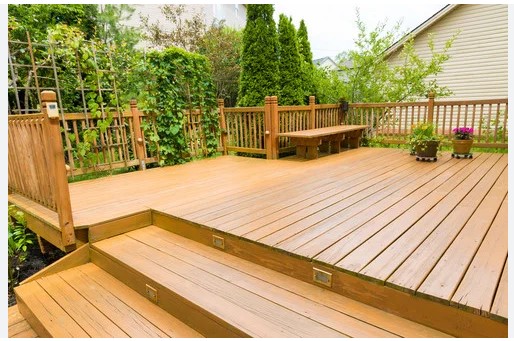
Source : https://blueandgreentomorrow.com
Deck Dynamics: Understanding Different Wood Types for Decks is a comprehensive guide to selecting the right wood type for your deck. This guide will provide you with the knowledge and understanding of the different types of wood available for deck construction, as well as the advantages and disadvantages of each type. It will also provide you with tips and tricks for selecting the right wood type for your deck, and how to properly maintain and care for your deck. With this guide, you will be able to make an informed decision when it comes to selecting the right wood type for your deck.
Exploring the Benefits of Different Deck Wood Types: What You Need to Know
When it comes to building a deck, the type of wood you choose is an important decision. Different types of wood offer different benefits, and it is important to understand the advantages and disadvantages of each type before making a selection. This article will explore the benefits of different deck wood types, so you can make an informed decision when it comes to building your deck.
The most common type of wood used for decks is pressure-treated lumber. Pressure-treated lumber is treated with a preservative that helps protect it from rot, decay, and insect damage. It is also relatively inexpensive and easy to work with. The downside of pressure-treated lumber is that it is not as durable as other types of wood, and it can be prone to warping and splitting.
Cedar is another popular choice for decks. Cedar is naturally resistant to rot and decay, and it is also very durable. It is also relatively easy to work with and is aesthetically pleasing. The downside of cedar is that it is more expensive than pressure-treated lumber, and it can be prone to splintering.
Redwood is another popular choice for decks. Redwood is naturally resistant to rot and decay, and it is also very durable. It is also aesthetically pleasing and has a beautiful natural color. The downside of redwood is that it is more expensive than other types of wood, and it can be prone to warping and splitting.
Composite decking is a newer option for decks. Composite decking is made from a combination of wood fibers and plastic, and it is designed to be more durable and resistant to rot and decay than traditional wood. It is also relatively easy to work with and is aesthetically pleasing. The downside of composite decking is that it is more expensive than other types of wood, and it can be prone to fading and staining.
When it comes to building a deck, there are many different types of wood to choose from. Each type of wood offers different benefits, and it is important to understand the advantages and disadvantages of each type before making a selection. This article has explored the benefits of different deck wood types, so you can make an informed decision when it comes to building your deck.
Comparing Deck Wood Types: Which is Best for Your Project?
When it comes to choosing the right type of wood for your decking project, there are a few factors to consider. Different types of wood have different characteristics that can affect the look, feel, and durability of your deck. Here, we will discuss the different types of wood available for decking and the advantages and disadvantages of each.
The most common type of wood used for decking is pressure-treated lumber. Pressure-treated lumber is treated with a preservative to protect it from rot, decay, and insect damage. It is also relatively inexpensive and easy to work with. However, pressure-treated lumber can be prone to warping and splitting over time, and it may require regular maintenance to keep it looking its best.
Cedar is another popular choice for decking. Cedar is naturally resistant to rot and decay, making it a great choice for outdoor projects. It is also relatively lightweight and easy to work with. However, cedar can be expensive and may require regular maintenance to keep it looking its best.
Composite decking is a newer option that is becoming increasingly popular. Composite decking is made from a combination of wood fibers and plastic, making it more durable and resistant to rot and decay than traditional wood. It is also low-maintenance and easy to install. However, composite decking can be more expensive than traditional wood and may not have the same natural look and feel.
When choosing the right type of wood for your decking project, it is important to consider your budget, the look and feel you want to achieve, and the amount of maintenance you are willing to do. Each type of wood has its own advantages and disadvantages, so it is important to weigh all of your options before making a decision.
Conclusion
In conclusion, Deck Dynamics: Understanding Different Wood Types for Decks is an invaluable resource for anyone looking to build a deck. It provides a comprehensive overview of the different types of wood available, their advantages and disadvantages, and the best practices for building a deck. With this knowledge, anyone can make an informed decision about the type of wood to use for their deck and ensure that it will last for years to come.
